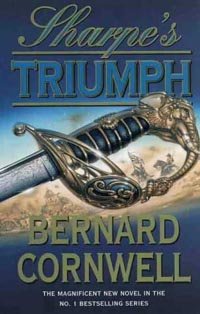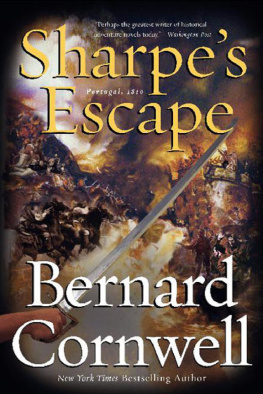Bernard Cornwell - Sharpes Adventure 16 Sharpes Honour: Richard Sharpe and the Vitoria Campaign, February to June 1813
Here you can read online Bernard Cornwell - Sharpes Adventure 16 Sharpes Honour: Richard Sharpe and the Vitoria Campaign, February to June 1813 full text of the book (entire story) in english for free. Download pdf and epub, get meaning, cover and reviews about this ebook. year: 1994, publisher: HarperCollins, genre: Adventure. Description of the work, (preface) as well as reviews are available. Best literature library LitArk.com created for fans of good reading and offers a wide selection of genres:
Romance novel
Science fiction
Adventure
Detective
Science
History
Home and family
Prose
Art
Politics
Computer
Non-fiction
Religion
Business
Children
Humor
Choose a favorite category and find really read worthwhile books. Enjoy immersion in the world of imagination, feel the emotions of the characters or learn something new for yourself, make an fascinating discovery.

- Book:Sharpes Adventure 16 Sharpes Honour: Richard Sharpe and the Vitoria Campaign, February to June 1813
- Author:
- Publisher:HarperCollins
- Genre:
- Year:1994
- Rating:4 / 5
- Favourites:Add to favourites
- Your mark:
- 80
- 1
- 2
- 3
- 4
- 5
Sharpes Adventure 16 Sharpes Honour: Richard Sharpe and the Vitoria Campaign, February to June 1813: summary, description and annotation
We offer to read an annotation, description, summary or preface (depends on what the author of the book "Sharpes Adventure 16 Sharpes Honour: Richard Sharpe and the Vitoria Campaign, February to June 1813" wrote himself). If you haven't found the necessary information about the book — write in the comments, we will try to find it.
Bernard Cornwell: author's other books
Who wrote Sharpes Adventure 16 Sharpes Honour: Richard Sharpe and the Vitoria Campaign, February to June 1813? Find out the surname, the name of the author of the book and a list of all author's works by series.
Sharpes Adventure 16 Sharpes Honour: Richard Sharpe and the Vitoria Campaign, February to June 1813 — read online for free the complete book (whole text) full work
Below is the text of the book, divided by pages. System saving the place of the last page read, allows you to conveniently read the book "Sharpes Adventure 16 Sharpes Honour: Richard Sharpe and the Vitoria Campaign, February to June 1813" online for free, without having to search again every time where you left off. Put a bookmark, and you can go to the page where you finished reading at any time.
Font size:
Interval:
Bookmark:

for
Jasper Partington and Shona Crawford Poole,
who marched from the very start.
We'll search every room for to find rich treasure,
And when we have got it we'll spend it at leisure.
We'll card it, we'll dice it,
we'll spend without measure,
And when it's all gone, bid adieu to all pleasure.
From: The Grenadier's March (Anon),
Quoted in THE RAMBLING SOLDIER, edited by Roy Palmer, Penguin Books, 1977.
There was a secret that would win the war for France. Not a secret weapon, nor some surprise strategy that would send the enemies of France reeling in defeat, but a sleight of politics that would drive the British from Spain without a musket being fired. It was a secret that must be kept, and must be paid for.
To which end, on a pitiless winter's day in 1813, two men climbed into the northern hills of Spain. Whenever the road forked they took the lesser path. They climbed by frost-hardened tracks, going ever higher into a place of rocks, eagles, wind, and cruelty, until at last, at a place where the far sea could be seen glittering beneath a February sun, they came to a hidden valley that smelt of blood.
There were sentries at the valley's head; men wrapped in rags and pelts, men with muzzle-blackened muskets. They stopped the travellers, challenged them, then incongruously knelt to one of the horsemen, who, with a gloved hand, made a blessing over their heads. The two men rode on.
The smaller of the two travellers, the keeper of this secret of secrets, had a thin, sallow face that was pockmarked by the old scars of smallpox. He wore spectacles that chafed the skin behind his ears. He stopped his horse above a rock amphitheatre that had been made when this valley was mined for iron. He looked with his cold eyes at the scene below him. `I thought you didn't fight the bulls in winter.'
It was a crude bullfight, nothing like the splendour of the entertainment provided in the barricaded plazas of the big cities to the south. Perhaps a hundred men cheered from the sides of the rock pit, while, beneath them, two men tormented a black, angry bull that was slick with the blood drawn from its weakened neck muscles. The animal was weak anyway, ill fed through the winter, and its charges were pitiful, easily evaded, and its end swift. It was not killed with the traditional sword, nor with the small knife plunged between its vertebrae, but by a poleaxe.
A huge man, clothed in leather beneath a cloak of wolfs fur, performed the act. He swung the great axe, its blade glittering in the weak sun, and the animal tried to swerve from the blow, failed, and it bellowed one last useless challenge at the sky as the axe took its life and cut down, through bone and pipes and sinews and muscles, and the men about the rock pit cheered.
The small man, whose face showed distaste for what he saw, gestured at the axeman. `That's him?'
That's him, Major.' The big priest watched the small, bespectacled man as if enjoying his reaction. That's El Matarife.' The nickname meant `the Slaughterman'.
El Matarife was a frightening sight. He was big, he was strong, but it was his face that caused fear. He was bearded so thickly that his face seemed half man and half beast. The beard grew to his cheekbones, so that his eyes, small and cunning, appeared in a slit between beard and hair. It was a bestial face that now looked up, over the dead bull, to see the two horsemen above him. El Matarife bowed mockingly to them. The priest raised a hand in reply.
The men about the rock pit, Partisans who followed the Slaughterman, were calling for a prisoner. The carcass of the bull was being dragged up the rocks, going to join the three other dead animals that had left their blood on the white-frosted stone.
The small man frowned. `A prisoner?'
`You can hardly expect El Matarife not to have a welcome for you, Major? After all it's not every day that a Frenchman comes here.' The priest was enjoying the small Frenchman's discomfiture. `And it might be wise to watch, Major? To refuse would be seen as an insult to his hospitality.'
`God damn his hospitality,' the small man said, but he stayed nonetheless.
He was not impressive to look at, this small Frenchman whose glasses chafed his skin, yet the appearance was deceptive. Pierre Ducos was called Major, though whether that was his real rank, or whether he held any rank in the French army at all, no one knew. He called no man `sir', unless it was the Emperor. He was part spy, part policeman, and wholly politician. It was Pierre Ducos who had suggested the secret to his Emperor, and it was Pierre Ducos who must make the secret come true and thus win the war for France.
A fair-headed man, dressed only in a shirt and trousers, was pushed past the bulls' carcasses. His hands were tied behind his back. He was blinking as though he had been brought from a dark place into the sudden daylight.
`Who is he?' Ducos asked.
`One of the men he took at Salinas.'
Ducos grunted. El Matarife was a Partisan leader, one of the many who infested the northern hills, and he had lately surprised a French convoy and taken a dozen prisoners. Ducos pushed at the earpiece of his spectacles. `He took two women.'
`He did,' the priest said.
`What happened to them?'
`You care very much, Major?'
`No.' Ducos' voice was sour. `They were whores.'
`French whores.'
`But still whores.' He said it with dislike. `What happened to them?'
`They ply their trade, Major, but their payment is life instead of cash.'
The fair-headed man had been taken to the base of the rock pit and there his arms were cut free. He flexed his fingers in the raw, cold air, wondering what was to happen to him in this place that stank of blood. There was a mood of expectant enjoyment among the spectators. They were quiet, but they grinned because they knew what was to happen.
A chain was tossed to the pit's floor.
It lay there, links of rusting iron in the bull's blood which had steamed in the cold. The prisoner shivered. He took a step back as a man picked up one end of the chain, but then submitted quietly as the links were tied to his left forearm. The Slaughterman, his huge beard flecked with the blood of the bull, picked up the other end of the chain. He looped it about his own left arm and laughed at the prisoner. `I shall count the ways of your death, Frenchman.'
The French prisoner did not understand the Spanish words. He did understand, though, the knife that was tossed to him; a long, wicked-bladed knife that was identical to the weapon in the hands of El Matarife. The chain that linked the two men was ten feet long. The priest smiled. `You've seen such a fight?'
`No.'
`There is a skill to it.'
`Undoubtedly,' Ducos said drily.
The skill was all with the Slaughterman. He had fought the linked knife fight many times, and he feared no opponent. The Frenchman was brave, but desperate. His attacks were fierce, but clumsy. He was pulled off balance by the chain, he was tormented, he was cut, and with every slice of El Matarife's knife the count was shouted out by the watching partisans. `Uno.r greeted a slash that opened the Frenchman's forehead to his skull. 'Dos' saw his left hand slit between his fingers. The numbers mounted. Ducos watched. `How long does it go on?'
Font size:
Interval:
Bookmark:
Similar books «Sharpes Adventure 16 Sharpes Honour: Richard Sharpe and the Vitoria Campaign, February to June 1813»
Look at similar books to Sharpes Adventure 16 Sharpes Honour: Richard Sharpe and the Vitoria Campaign, February to June 1813. We have selected literature similar in name and meaning in the hope of providing readers with more options to find new, interesting, not yet read works.
Discussion, reviews of the book Sharpes Adventure 16 Sharpes Honour: Richard Sharpe and the Vitoria Campaign, February to June 1813 and just readers' own opinions. Leave your comments, write what you think about the work, its meaning or the main characters. Specify what exactly you liked and what you didn't like, and why you think so.







